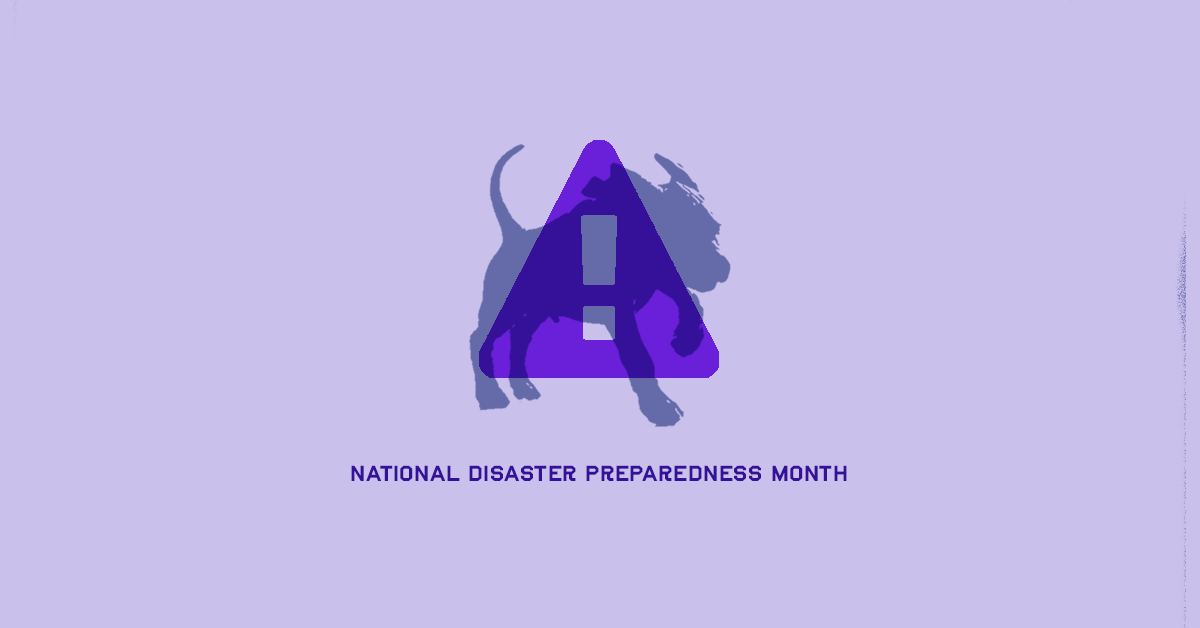
It may seem unlikely that a natural disaster would impact your family, but the unexpected could occur at any time. Even if it’s not a cataclysmic event, uncertain times can lead to stress and an unsafe family (for both your two- and four-legged loved ones)! Whether a natural disaster or minor inconvenience, here’s a quick how-to to help you prepare your pets for the unexpected.
1. Pack a go-bag for your pet
Vacating your home in a hurry can mean forgetting important pet items like food, toys, medicines, and bedding. Adding your pet’s must-haves to a bag will ensure you can quickly leave home and still care for your pet! Here’s a quick list of items to include:
- Microchip number and contact information
- Several weeks’ worth of food
- Food/water bowls
- Medicines
- Treats
- An extra collar, harness, and leash
- Extra towels or sheets for bedding
- A bed (if you have space)
- A hand-pump water filter
2. Do your homework
Natural disasters and weather-related threats can vary based on where you live. To prepare your home and your family (including your pets), research the sort of events that impact your community. The more you know about the natural phenomenon in your area, the better you can prepare your pets.
3. Have pet first aid available
Though never a substitute for veterinary care, a first aid kit can help to save your pet’s life in an emergency. What to include in your kit will vary based on the species, age, and medical needs of your pet. If you’re unsure where to start, check out this basic list created by The American Veterinary Medical Association.
4. Compile a list of emergency vets
The impact of a natural disaster can be localized to a small area within your community. By compiling a list of emergency vets in your local, immediate, and general location, you’ll have a better chance of accessing veterinary care during a natural disaster or weather-related emergency should you be impacted. If you have a set location you plan to evacuate to (like during a hurricane), consider finding an emergency vet ahead of time.
5. Make returning your pet easy
You can help to ensure the return of a lost pet by keeping their microchip information current. If your pet isn’t chipped, consider having that done soon as it serves as a permanent form of identification. Additionally, your pet’s name tag can become hard to read after a few years. Be the sure contact information on the tag is both current and clearly visible. Also, in addition to a name tag, many pet owners are purchasing collars embroidered with the pet’s name and appropriate contact information.
6. Avoid the spread of disease
In the wake of natural disasters, disease is often a threat to the health of both humans and their pets. This is particularly true with illnesses that can pass from pets to owners (and visa-versa). These include rabies, leptospirosis, Lime Lyme disease – to name a few. To reduce the risk of contracting these diseases, avoid crowded areas with unfamiliar animals and other people. Stagnant water is also a major purveyor is sickness. While not always possible, try to keep away from areas with puddles, ponds, or slow-moving streams.
Pet insurance is the best way to prepare for the unexpected when it comes to the health and wellness of your furry friends. Companion Protect® is proud to stand out from the pet insurance noise, with comprehensive coverage that’s best for you (your wallet) and your pet … when it’s needed most. Fetch a no-obligation quote!
 WILSON WEAVER
WILSON WEAVER
Copywriter
Wilson has written for brands in the tech, e-commerce, construction, health, and finance industries. In his free time, he enjoys cooking for friends and family, spoiling his dog-daughter (Penny), painting, and playing music with friends. And speaking of food, his favorite meal is his mom’s pot roast and mashed potatoes!

